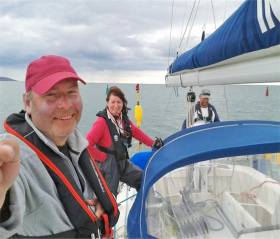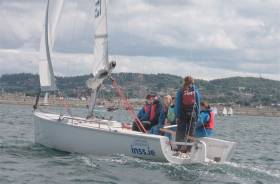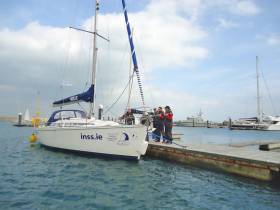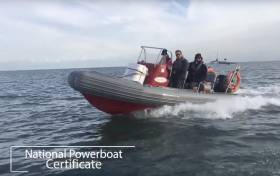Displaying items by tag: Irish National Sailing and Powerboat School
Learn From An Expert On INSS South East Summer Cruises
#Cruising - Leisurely cruising isn’t all that’s on the agenda when the Irish National Sailing & Powerboat School’s Elan 36, Beaufort Venture, sails the South East Coast this July.
INSS cruising instructor Gary Curran will lead each cruise in a series of mile-building passages, giving expert guidance to help you practice the skills you need for your own yachting and cruising programmes.
Places are still available on two of the five cruises (€560 each, travel and meals not included) which promise to include everything you will find in the INSS’s standard Competent Crew or Day Skipper courses.
Cork to Castletownbere to Schull from 6-10 July and the return journey from 12-16 July are both five-day cruises. Book quickly to avoid disappointment via the INSS website HERE.
#TrySailing - Sunday 14 May is the date for the Irish National Sailing & Powerboat School’s 2017 Open Day — where anyone can try sailing, kayaking or paddleboarding at Dun Laoghaire Harbour for only €10.
All ages are welcome on the day, whether families, friends or individuals, for what promises to be an exciting day on the water — coinciding with the annual Sail-a-thon charity event organised by sailors attending the INSS junior club sailing programme.
Whether you’re entirely new to the sport or rekindling an old flame, you’ll be learning how to sail on board one of the school’s fleet of 1720 sportsyachts — waterproof overalls and lifejackets provided!
Those interested in kayaking and paddleboarding, meanwhile, will be guided around the sheltered waters inside Dun Laoghaire Harbour to give a taste of what makes these activities so appealing.
Details on booking a session for the day can be found on the INSS website HERE.
Day Course On Mooring & Handling Yachts Under Power
#HowToSail - A new series of short yachting courses at the Irish National Sailing & Powerboat School (INSS) begins with a one-day course on various techniques for mooring and handling a yacht under power.
This day-long course (9.30am-5pm) will run three times over the summer, with the first on Sunday 7 May, and covers the following topics:
- Basic engine checks
- Throttle and gear controls
- Rudder, propellers, propwalk and pivot points
- Going ahead and astern
- Use of wind and stream to aid manoeuvres
- Manoeuvring in confined spaces
- Moving to and from a marina berth under power
- Use of springs and other berthing techniques
The €99 course is recommended for any sailors heading abroad over the summer months who want to brush up on moving about tighter spaces, or those thinking about doing an ICC assessment.
Irish National Sailing & Powerboat School 'Urgently' Requires Powerboat Instructors & Staff
The powerboat business in Ireland seems to be getting busier so the Irish National Sailing & Powerboat School are appealing for more powerboat instructors. School Principal Kenneth Rumball says the Dun Laoghaire–based school is also looking for some full time admin staff to help in the office.
The Irish National Sailing and Powerboat School has an ever-expanding powerboat market and requires enthusiastic instructors to help deliver these courses from our main base in Dun Laoghaire however we also deliver courses in other locations on request. We have a unique opportunity this year for those persons who may be interested in teaching powerboating.
The INSAPS is offering to cover the cost of training for powerboat instructors and then give these instructors the chance to teach on our busy courses that run year round in our state of the art RIBs as seen in many of our promotional videos. Previous instructing experience is not necessary however previous powerboat experience is required.
As our powerboat and other courses continue to grow, we are also looking for a charismatic enthusiastic office administrator to join our busy bookings and enquiries team. Applicants should have a keen interest in sailing. Instructing experience is not necessary for this position however computer literacy and willingness to help in sales is required.
If you are interested in teaching powerboat courses this year or joining our busy office team, do not hesitate to contact [email protected] for more information.



























































